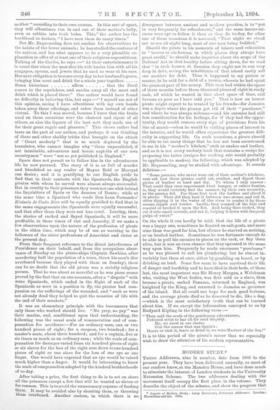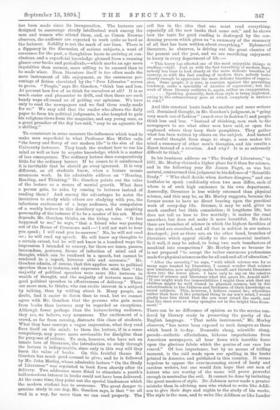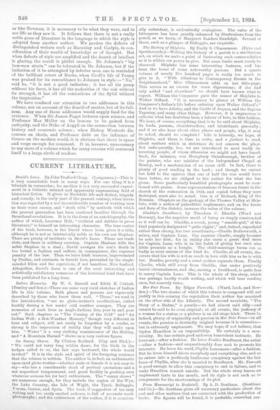MODERN STUDY.* ThESE Addresses, nine in number, date from 188G
to the present year. They have been delivered annually, as most of our readers know, at the Mansion House, and have done much to stimulate the interest of London students in the University Extension Scheme. The two addresses dealing with the movement itself occupy the first place in the volume. They describe the object of the scheme, and show the progress that • Aspeote of Modern, Study ; being University Extension Addresses. London: Macmillan and Co. 1894. has been made since its inauguration. The lectures are designed to encourage steady intellectual work among the men and women who attend them, and, as Canon Browne observes, the audience are expected to work quite as hard as the lecturer. Solidity is not the mark of our time. There is a flippancy in the discussion of serious subjects, a want of reverence for the past, a thoughtless haste in arriving at con- clusions, and a superficial knowledge gleaned from a running glance over books and periodicals,—which marks an age more inquisitive than earnest, more willing to be amused than to be made wiser. Even literature itself is too often made the mere instrument of idle enjoyment, as the enormous per- centage of fiction circulated by the " Free Libraries " serves to prove. "People," says Mr. Gosehen, "think less and less. At present how few of us think for ourselves at all P It is so much easier and pleasanter to drift, and then there are such handy ways all round us of getting our opinions. We have only to read the newspapers and we find them ready-made for us." We may add that the reader who allows the daily paper to form his political judgments, is also tempted to gain his religions views from the magazine, and any young man, as a great preacher of the day has said, "may be an agnostic for a shilling."
To counteract in some measure the influences which tend to make men superficial in what Professor Max Muller calls "the hurry and flurry of our modern life" is the aim of the University lecturers. They teach the student how to use his mind as well as how to acquire knowledge, which is a matter of less consequence. The ordinary lecture does comparatively little for the ordinary hearer. If he comes to it uninformed it is inevitable that he should go away ignorant. It is very different, as all students know, when a lecture means strenuous work. In his admirable address on "Hearing, Reading, and Thinking." Mr. Gosehen points out the value of the lecture as a means of mental growth. What does a person gain, he asks, by coming to lectures instead of reading them F And among the advantages he notes the incentives to study while otbers are studying with you, the infectious excitement of a large audience, the compulsion of a weekly lecture in this desultory age, and the inspiring personality of the lecturer if ho be a master of his art. Much depends, Mr. Gosehen thinks, on the living voice. "It has happened to me," he says, " that a friend who was passing out of the House of Commons said l—' I will not wait to hear you speak; I will read you to-morrow.' No, he will not read me ; he will read my speech. He will know my thoughts to a certain extent, but he will not know in a hundred ways the impression I intended to convey, for there are tones, pauses, innuendoes, gestures, forms of inflection of mind and of thought, which can be rendered in a speech, but cannot be rendered in a report, however able and accurate." Mr. Gosehen admits, of course, that this applies more to political speeches than to lectures, and expresses the wish that " the majority of political speeches were more like lectures in wealth of thought, and the majority of lectures more like good political speeches in effectiveness of delivery." There are more men, he thinks, who can excite interest in a subject by talking, than by writing about it. Many people, no doubt, find it easier to listen than to read, but we cannot agree with Mr. Gosehen that the persons who gain more from books than lectures may be regarded as exceptions. Although fewer perhaps than the lecture-loving audience, they are, we believe, very numerous. The excitement of a crowd, so far from rousing, distracts this class of students. What they hear conveys a vague impression, what they read fixes itself on the mind; to them the lecture, if in a sense compulsory, may prove more serviceable for discipline than for purposes of culture. To men, however, who have not an innate love of literature, the introduction to study through the lecture is indispensable, since only in this way will they learn the value of books. On this fruitful thenie Mr. Gosohen has much good counsel to give ; and he is followed by Mr. John Morley, whose admirable lecture " On the Study of Literature" was reprinted in book form shortly after its delivery. Two addresses more fitted to stimulate a youth's half-conscious interest in books could not have been delivered. At the same time, they point out the special hindrances which the modern student has to overcome. The great danger to genuine study in our day, Mr. Gosohen says, is that " we all read in a way, far more than we can read properly. The evil lies in the idea that one must read everything, especially all the new books that come out," and he shows how the taste for good reading is destroyed by the con- densing process which gives us "a summary of the summary of all that has been written about everything." Ephemeral literature, he observes, is driving out the great classics of the present and the past, and we are sacrificing enjoyment to hurry in every department of life :- " This hurry has affected one of the most enjoyable things in reading—style. Just as with the fast travelling of modern days, nobody has time to look closely at the more delicate beauties of scenery, so with the fast reading of modern days, nobody looks closely enough to appreciate the more delicate beauties of expres- sion. Some people, it is true, in reaction against the prevailing tendency, make a speciality of niceties of expression ; but the work of these literary aesthetes is, again, rather an exaggeration.
Speaking generally, first-class style is being neglected, owing to the extraordinary pace at which everybody is anxious to read."
And this constant haste leads to another and more serious evil. Sustained thought, in Mr. Gosohen's judgment, is " going very much out of fashion " (was it ever in fashion ?) and people think less and less. "Instead of thinking, men rush to the newspapers to see what other men have said, or open the cupboard where they keep their pamphlets. They gather what has been written by others on the subject. And instead of careful thought from stage to stage, a man makes his mind a summary of other men's thoughts, and his results a digest instead of a creation. And why P It is so extremely difficult to think."
In his luminous address on "The Study of Literature," in 1887, Mr. Morley claimed a higher place for it than for science, and in the following year Sir James Paget, as was but natural, contravened this judgment in his defence of " Scientific Study." "Who shall decide when doctors disagree," and one hesitates to speak confidently when two men differ, each of whom is of such high eminence in his own department. Assuredly, literature is less widely esteemed than physical science, and this may be, as Mr. Morley suggests, because the former seems to have no direct bearing upon the practical work of every-day life. Science, it may be said, gives us much comfort but little consolation ; it lengthens life, but does not tell us how to live worthily ; it makes the road smoother, but does not make it more beautiful. No doubt there are branches of science in which the highest faculties of the mind are exercised, and all that is noblest in our nature developed ; just as there are, on the other hand, branches of literature which appeal chiefly to the commercial instinct. Is it well, it may be asked, to bring two such benefactors of mankind into comparison? Mr. Morley does so because he is not prepared "to accept the rather enormous pretensions made for physical science as the be-all and end-all of education."
" After the severity," he says, " with which science was for so many ages treated by literature, I cannot wonder that science now retaliates, now mightily exalts herself, and thrusts literature down into the lower place. I have only to say on the relative claims of science and literature what the great Dr. Arnold said : 'If one might wish for impossibilities I might then wish that my children might be well versed in physical science, but in due subordination to the fullness and freshness of their knowledge on moral subjects. This, however, I believe cannot be ; wherefore rather than have it the principal thing in my son's mind, I would gladly have him think that the sun went round the earth, and that the stars were so many spangles set in the bright blue firma- ment: " There can be no difference of opinion as to the service ren- dered by literary study in preserving the purity of the English language. " That noble instrument," Mr. Morley observes, " has never been exposed to such dangers as those which beset it to-day. Domestic slang, scientific slang, pseudo - a3sthetic affectations, hideous importations from American newspapers, all bear down with horrible force upon the glorious fabric which the genius of our race has reared." Of less importance, but by no means of trifling moment, is the raid made upon our spelling in the books printed in America and published in this country. It seems hopeless to oppose the ever-increasing crowd of hasty and careless writers, but one would fain hope that our men of letters who are worthy of the name will prove powerful enough to neutralise the evil. It cannot be done by imitating the great masters of style. Dr. Johnson never made a greater mistake than in advising men who wished to write like Addi- son to give their days and nights to the study of his works. The style is the man, and to write like Addison or like Landor or like Newman, it is necessary to be what they were, and to see life as they saw it. It follows that there is not a really noble piece of literature in the language in which the style is adopted from another author. We pardon the defects of distinguished writers such as Macaulay and Carlyle, in con- sideration of their wealth of knowledge or of thought. But when defects of style are amplified and the dearth of intellect is glaring, the result is pitiful enough. Dr. Johnson's "big bow-wow strain" can be tolerated in Dr. Johnson, but if the imitation of it be attempted by inferior men, one is reminded of the brilliant retort of Burke, when Croft's life of Young was praised for its resemblance to Johnson in style :—" No," said he, "it is not a good imitation ; it has all his pomp without his force, it has all the nodosities of the oak without its strength, it has all the contortions of the Sybil without the inspiration."
We have confined our attention to two addresses in this volume, not on account of the dearth of matter, but of its full- ness. Any one of these addresses would supply food for the reviewer. When Sir James Paget lectures upon science, and Professor Max Muller on the lessons to be gained from antiquity, and the Duke of Argyll on the connection between history and economic science ; when Bishop Westcott dis- courses on ideals, and Professor Jebb on the influence of Greece on the modern world, it is obvious that there is space and verge enough for comment. It is, however, unnecessary to say more of a volume which for many reasons will commend itself to a large circle of readers.




































 Previous page
Previous page